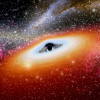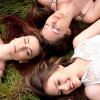What is it like to see a nuke go off?
Interview with
Fusion bombs were first tested in the South Pacific in the 1950s and Ken McGinley - who was still a teenager at the time - spoke about what it was like to witness one from his military base on Christmas Island...
肯,我站在沙滩上。必须有been about 400 servicemen standing there waiting for the bomb drop. We didn't know what to expect. The plane did about two dummy runs, and it was very, very hot standing there with a boiler suit, standing for over an hour. Finally, the all clear was given and the countdown began: 3, 2, 1. Then, all of a sudden, there was this magic flash. We were told to put our fists into our eye sockets, not to look at the bomb. And when it went off, we were given the order to turn around and face the bomb and the heat from it was tremendous. But the thing that I noticed more than anything else was I could see the complete bone structure of both my hands, even through closed eyes and clenched fists. That was quite scary, and I think the natural reaction from myself, like other people, was to take my hands away. I felt it actually burning my body. The thing that followed after that, of course, was the shockwave. By that time, we were all sort of talking to each other and, when the shockwave hit us, some of the men fell down and were knocked over on their backs. And some of them were actually crying. And then we saw the bomb, which was unbelievable, all different colours in a giant mushroom, and then the next thing, of course, it was coming right towards us.
Chris - Were you at all concerned about danger from this? Obviously, there was the shockwave and the heat, but the invisible danger of the radiation. People were aware of that, were they?
Ken - I had never heard the word radiation in the year that I served on Christmas Island. I had never heard about dangers. We didn't even know anything about who we were going to see until we were three weeks out at sea. And I remember Sergeant Ward gathered us all up on a deck that day and he told us we were going to witness bomb tests. We had never heard of Hiroshima or Nagasaki, anything like that. At our age, the first page you turned to in a newspaper was the back page to look at the sport. I woke up about two days after the first bomb test. I couldn't open my eyes up. My face had quite a few blisters on it, and so had my chest. I went along to the MO and there was quite a queue of guys standing there. We were all given this clear lotion to rub on our faces to maybe take away the blisters. But it was okay, actually. After a couple of days it all cleared up again.
Chris - So what happened to your career in the military after that?
Ken - After Christmas Island, we went back to the UK again. We were posted to a place in northeast England. We were building roadways, etc. One night, I woke up and I was coughing quite a lot. I switched the light on in the tent and looked at my sheet. My pillow had quite a few spots of blood. They gave me two pills. I fell asleep. I woke up in the morning and I was told to go back to my job again. I was in severe pain, my stomach pains. The diagnosis was actually that, at my ripe old age of 20, I had a very active duodenal ulcer. I was told to report to Cowglen Military Hospital in Glasgow where I would be medically discharged from the army.









Comments
Add a comment